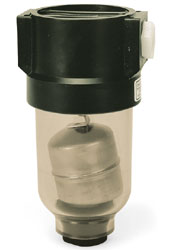

For pressures to 150 psig (7 bar) or specific gravity down to 0.80
For pressures to 150 psig (7 bar) or specific gravity down to 0.80
Now you can literally see what you’ve been missing—the early warning
signs of a system problem. Since you’ll know the operating condition of
the air vent, you won’t have to waste time and money scheduling
maintenance that isn’t needed. In other words, you will be able to react
to a condition before it becomes a problem.
A simple ball-float mechanism requiring no
electricity to operate, the Armstrong 1-AVC discharges automatically
only when air/gas are present. That means no liquid loss, as with manual
venting.
The see-thru body means you can observe changing
conditions as they occur. See a problem in the making—instead of having
to deal with it after the fact.
The free-floating valve mechanism ensures
positive seating, so it prevents liquid loss. There are no fixed pivots
to wear or create friction, and wear points are heavily reinforced for
long life.
Stainless steel internals mean corrosion resistance and reduced maintenance.
Long-lasting polysulfone body and reinforced nylon cap resist corrosion and provide long, trouble-free service life.
Seeing really is believing—especially when you
compare the Armstrong 1-AVC see-thru air vent with manual venting.
Measure the differences in the time and money you can save with a more
efficient, easier-to-maintain system.
NOTE: The Armstrong 1-AVC
should not be used in an environment where there are high levels of
ketones or chlorinated or aromatic hydrocarbons.
For help in specifying the exact model you need, download the product literature.
No PDF available for download.
No PDF available for download.
No PDF available for download.
Copyright © 2025 Campbell-Sevey, Inc.